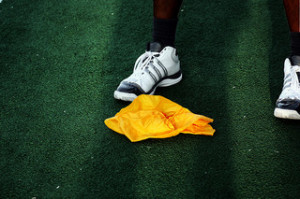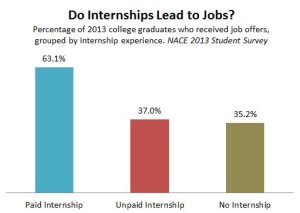
Does your sports industry internship deserve a flag? Read on to find out.
If money and sports go hand in hand, why can’t many of the deserving students and young professionals get a paid internship in the sports industry?
If you’ve been living under a rock the past few months, the debate surrounding internship compensation is alive and well, with more fuel being added to the proverbial fire against unpaid internships each month.
The fashion, entertainment and publishing industries have been set ablaze with class-action lawsuits to recover unpaid federal minimum wage and overtime pay for interns.
Now, the sports industry is up to bat.
Why A Big-time Sports Industry Internship Is NOT A Win-win
The first sports industry employer to get hit with a well-deserved class-action lawsuit is famed sporting arena Madison Square Garden. Former interns are claiming the company wrongly classified them in an attempt to avoid paying up. Former interns claim Madison Square Garden used titles like “intern” or “student associate” when hiring students, even though these hires were doing work that qualified them as employees.
For example, it’s been alleged that interns were clocking in five days a week to help support ticket and sponsorship sales, administrative projects and logistics pertaining to the organization of sports and entertainment events at the arena.
It’s no secret that unpaid internships are a common practice in the sports industry – or any industry, for that matter. But why are we just now questioning the malpractice of sports industry employers?
It may be because students and recent graduates have been conditioned to think taking an unpaid internship opportunity is a rite of passage, one where the experience far outweighs the need for compensation. But I’m here to tell you this ideal is a vestige of the past, and sports industry employers profiting from unpaid interns are about to be dragged through the mud.
The Industry Can Afford To Pay Interns
They can spare to pay a few intern salaries
Let’s face it, the identity of most Americans is founded in a love for sports. This is why it’s not surprising that the estimated worth of the U.S. sports industry is at least $400 billion. The NFL makes $9 billion and the NBA pulls in a little more than $4 billion in annual revenue. These figures make it pretty hard for sports industry employers to argue that they just don’t have the funds to generate paid internships.
Meanwhile, there are two sides to this compensation tale. There are the employers who should feel ashamed for duping students and recent graduates into being taken advantage of in the name of experience and a foot in the door of the sports industry. Then there are talented students and college graduates who feel powerless and settle for these internships rather than speaking up, a flawed power dynamic that only furthers the problem.
All Signs Point To Illegal
Questioning the legality of unpaid internships in public sector industries, like nonprofit or governmental sectors, is a bit tricky. But because the sports industry is part of the private sector, it’s pretty hard to argue that most of these unpaid internships are legally sound.
Thanks to the U.S. Department of Labor Wage Hour Division, we have something known as the Fair Labor Standards Act. These are internship guidelines that aim to help employers determine if they have to pay their interns, despite the fact they should want to anyway.
While these guidelines are known for being a bit confusing, they state that in order to be unpaid, an internship must be highly educational, or as close as possible to the educational experience students are receiving in college. In the case of Madison Square Garden’s internship program, a quick scan of the duties clearly shows the work of these so-called interns was equivalent to that of an average employee and thus deserving of fair wages.
What Student Can Go Without Pay?
What student or recent graduate has a pile of money laying around to cover their living costs during an unpaid internship? Not many.
Unpaid internships in the sports industry are essentially a gatekeeping mechanism shutting out those that can’t afford to make the financial sacrifice, which often includes moving to an expensive city and enduring the cost of living for the length of the internship.
This doesn’t make much sense when 60 percent of the 20 million students attending college borrow annually to cover costs. It’s also important to note that 65 percent of students rely on financial assistance from parents during their internships.
So what about those interns with no student loan money to spare and no aid from their parents? They get completely shut out from career-boosting internships. The ripple effect helps maintain the status quo, in which already-affluent students are more likely to get ahead.
Experience Doesn’t Always Equate To A Hire

While employers beg for resumes and portfolios exploding with experience, there’s no guarantee your unpaid internship will lead to employment. In fact, unpaid interns only end up turning into full time employees 37 percent of the time – a measly one percent bump over those with no internship experience at all. On the other hand, paid internships turn into a job 60 percent of the time. It’s time to bench the idea that uncompensated experience guarantees hire-ability.
It’s hard to say where the future of internships is headed, but I hope it’s in a direction rife with fair pay and beneficial experiences. The sports industry has long been battling a reputation problem, and the outcry from unpaid interns shouldn’t just be another notch in their belt. It’s time for both employers and interns to speak out against unpaid internships.
What do you think – should sports industry interns be paid? Let us know your thoughts in the comments below!


I was lucky…I was given an internship and eventually hired in. I wouldn’t have been able to take the opportunity if I hadn’t lived at home and received gas money from my parents. Loved the work and experience, but my parents likened it to “slave labor” with the number of hours I put in for no pay.
WME Solidifies Market Strength With IMG purchase